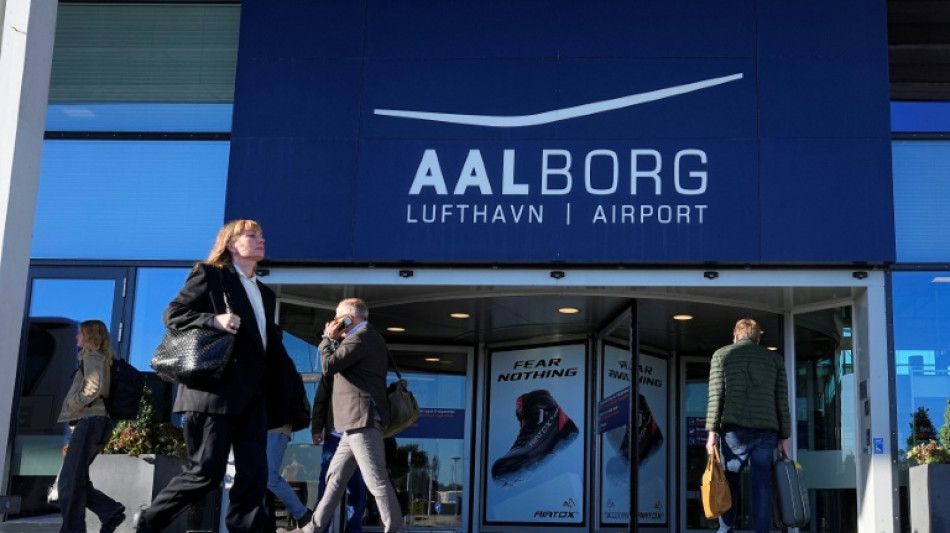

Danish airport closes again after suspected new drone sighting
A suspected drone sighting briefly shuttered a Danish airport on Friday for the second time in a few hours, after the country's prime minister said the flights were part of "hybrid attacks" that may be linked to Russia.
Drones have been seen flying over several Danish airports since Wednesday, causing one of them to close for hours, after a sighting earlier this week prompted Copenhagen airport to shut down.
That followed a similar incident in Norway, drone incursions in Polish and Romanian territory and the violation of Estonian airspace by Russian fighter jets, which raised tensions in light of Russia's ongoing invasion of Ukraine.
"Over recent days, Denmark has been the victim of hybrid attacks," Prime Minister Mette Frederiksen said in a video message on social media on Thursday -- referring to a form of unconventional warfare.
She warned that such drone flights "could multiply".
Investigators said they had so far failed to identify those responsible, but Frederiksen stressed: "There is one main country that poses a threat to Europe's security, and it is Russia."
Moscow said Thursday it "firmly rejects" any suggestion that it was involved in the Danish incidents. Its embassy in Copenhagen called them "a staged provocation", in a post on social media.
Denmark's Justice Minister Peter Hummelgaard earlier said the aim of the attack was "to spread fear, create division and frighten us".
He added that Copenhagen would acquire new enhanced capabilities to "detect" and "neutralise drones".
Denmark will on Friday join other EU countries, mostly along the eastern border with Russia, in the first talks on proposals to build a "wall" of anti-drone defences in the face of the tensions with Moscow.
- Russia sabotage warning -
Drones were spotted on Wednesday and early Thursday at airports in Aalborg, Esbjerg, Sonderborg and at the Skrydstrup air base before leaving on their own, police said.
Aalborg airport, located in northern Denmark, was initially shut down for several hours, and closed again for about an hour from late Thursday into early Friday morning due to another suspected sighting.
"It was not possible to take down the drones, which flew over a very large area over a couple of hours," North Jutland chief police inspector Jesper Bojgaard Madsen said about the initial Aalborg incident.
The head of Denmark's military intelligence, Thomas Ahrenkiel, told a news conference the service had not been able to identify who was behind the drones.
But intelligence chief Finn Borch said: "The risk of Russian sabotage in Denmark is high."
Danish Defence Minister Troels Lund Poulsen told a news conference the flights appeared to be "the work of a professional actor... such a systematic operation in so many locations at virtually the same time".
He said it had posed "no direct military threat" to Denmark.
Frederiksen said Thursday that she had spoken with NATO chief Mark Rutte about the incidents.
Lund Poulsen said the government had yet to decide whether to invoke NATO's Article 4, under which any member state can call urgent talks when it feels its "territorial integrity, political independence or security" are at risk.
French President Emmanuel Macron said his country stood ready "to contribute to the security of Danish airspace".
Copenhagen is set to host a summit of European Union leaders next week.
- 'Feel rather insecure' -
Police said investigations were under way with the Danish intelligence service and the armed forces.
The drone activity shook some in Denmark, including 85-year-old Birgit Larsen.
"I feel rather insecure. I live in a country where there has been peace since 1945. I am not really used to thinking about war," she told AFP in central Copenhagen.
Others were less concerned.
"It's probably Russia, you know, testing the borders of Europe. They fly close to the borders and stuff and try to provoke, but not threaten," said 48-year-old Torsten Froling.
The drone flights came after Denmark announced it would acquire long-range precision weapons for the first time, as Russia would pose a threat "for years to come".
P.Schulz--VZ



